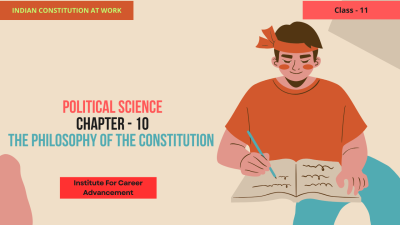Courses


 Compare
Compare
Rights are fundamental entitlements or claims that individuals have by virtue of being human. They are essential for human dignity, development, and well-being. Rights can be categorized into various types: Natural rights: Inherent rights that individuals possess by virtue of being human, regardless of any legal or social system. Legal rights: Rights that are granted by law and are enforceable through legal processes. Human rights: Fundamental rights that all individuals are entitled to, regardless of their nationality, race, gender, religion, or any other status. Civil rights: Rights that protect individuals from discrimination and ensure their equal participation in society. Political rights: Rights that enable individuals to participate in the political process, such as the right to vote, hold office, and express opinions. Economic rights: Rights that ensure individuals have access to basic economic resources and opportunities, such as the right to work and the right to education. Social rights: Rights that ensure individuals have access to essential social services, such as healthcare, housing, and education. Importance of rights: Human dignity: Rights are essential for upholding human dignity and ensuring that all individuals are treated with respect. Development: Rights are essential for human development, as they enable individuals to realize their full potential. Justice: Rights promote justice by ensuring that all individuals are treated fairly and equally. Equality: Rights are essential for promoting equality and ensuring that all individuals have equal opportunities. Social harmony: Rights contribute to social harmony by promoting understanding, tolerance, and cooperation. Democratic values: Rights are essential for democratic societies, as they ensure that individuals have a voice in the governance of their country. Challenges to rights: Violations: Rights can be violated by individuals, governments, or other organizations. Discrimination: Discrimination based on factors such as race, gender, religion, or socioeconomic status can hinder the enjoyment of rights. Inequality: Inequality in wealth, education, and opportunities can limit access to rights. Political marginalization: Certain groups may be excluded from political processes, limiting their ability to influence policy decisions. Economic disparities: Economic disparities can create unequal opportunities and access to resources. Promoting rights requires a multifaceted approach that includes: Legal reforms: Laws and policies that protect and promote rights. Social reforms: Programs and initiatives that address discrimination and inequality. Economic policies: Policies that promote economic growth and reduce inequality. Political reforms: Measures that ensure that all individuals have equal access to political participation. Education and awareness: Raising awareness about the importance of rights and promoting education on human rights. International cooperation: Working with other countries to promote and protect human rights globally. By addressing these challenges and promoting rights, societies can create a more just, equitable, and inclusive world. অধিকার হল মৌলিক অধিকার বা দাবি যা মানুষ হওয়ার কারণে ব্যক্তিদের রয়েছে। এগুলি মানুষের মর্যাদা, উন্নয়ন এবং কল্যাণের জন্য অপরিহার্য। অধিকারকে বিভিন্ন শ্রেণীতে ভাগ করা যেতে পারেঃ প্রাকৃতিক অধিকারঃ যে কোনও আইনি বা সামাজিক ব্যবস্থা নির্বিশেষে মানুষ হওয়ার কারণে ব্যক্তিরা যে অন্তর্নিহিত অধিকারের অধিকারী। আইনি অধিকারঃ আইন দ্বারা প্রদত্ত এবং আইনি প্রক্রিয়ার মাধ্যমে প্রয়োগযোগ্য অধিকার। মানবাধিকারঃ মৌলিক অধিকার যা সমস্ত ব্যক্তি তাদের জাতীয়তা, জাতি, লিঙ্গ, ধর্ম বা অন্য কোনও মর্যাদা নির্বিশেষে পাওয়ার অধিকারী। নাগরিক অধিকারঃ এমন অধিকার যা ব্যক্তিদের বৈষম্য থেকে রক্ষা করে এবং সমাজে তাদের সমান অংশগ্রহণ নিশ্চিত করে। রাজনৈতিক অধিকারঃ এমন অধিকার যা ব্যক্তিদের রাজনৈতিক প্রক্রিয়ায় অংশগ্রহণ করতে সক্ষম করে, যেমন ভোট দেওয়ার অধিকার, পদে অধিষ্ঠিত হওয়া এবং মতামত প্রকাশের অধিকার। অর্থনৈতিক অধিকারঃ এমন অধিকার যা ব্যক্তিদের মৌলিক অর্থনৈতিক সম্পদ এবং সুযোগের অ্যাক্সেস নিশ্চিত করে, যেমন কাজের অধিকার এবং শিক্ষার অধিকার। সামাজিক অধিকারঃ এমন অধিকার যা স্বাস্থ্যসেবা, আবাসন এবং শিক্ষার মতো প্রয়োজনীয় সামাজিক পরিষেবাগুলিতে ব্যক্তির প্রবেশাধিকার নিশ্চিত করে। অধিকারের গুরুত্বঃ মানব মর্যাদাঃ মানবাধিকার মানুষের মর্যাদা বজায় রাখার জন্য এবং সকল ব্যক্তির প্রতি সম্মানের সাথে আচরণ নিশ্চিত করার জন্য অপরিহার্য। উন্নয়নঃ মানুষের উন্নয়নের জন্য অধিকার অপরিহার্য, কারণ এগুলি ব্যক্তিদের তাদের পূর্ণ সম্ভাবনা উপলব্ধি করতে সক্ষম করে। ন্যায়বিচারঃ অধিকার সকল ব্যক্তির সঙ্গে ন্যায্য ও সমান আচরণ নিশ্চিত করে ন্যায়বিচারের প্রসার ঘটায়। সমতাঃ সমতার প্রচার এবং সকল ব্যক্তির সমান সুযোগ নিশ্চিত করার জন্য অধিকার অপরিহার্য। সামাজিক সম্প্রীতিঃ অধিকারগুলি বোঝাপড়া, সহনশীলতা এবং সহযোগিতা বৃদ্ধির মাধ্যমে সামাজিক সম্প্রীতির ক্ষেত্রে অবদান রাখে। গণতান্ত্রিক মূল্যবোধঃ গণতান্ত্রিক সমাজের জন্য অধিকার অপরিহার্য, কারণ তারা নিশ্চিত করে যে তাদের দেশের শাসনে ব্যক্তিদের একটি কণ্ঠস্বর রয়েছে। অধিকারের চ্যালেঞ্জঃ লঙ্ঘনঃ ব্যক্তি, সরকার বা অন্যান্য সংস্থার দ্বারা অধিকার লঙ্ঘিত হতে পারে। বৈষম্যঃ জাতি, লিঙ্গ, ধর্ম বা আর্থ-সামাজিক অবস্থানের মতো বিষয়গুলির উপর ভিত্তি করে বৈষম্য অধিকারের উপভোগকে বাধা দিতে পারে। অসমতাঃ সম্পদ, শিক্ষা এবং সুযোগের অসমতা অধিকারের প্রাপ্যতা সীমিত করতে পারে। রাজনৈতিক প্রান্তিকীকরণঃ কিছু গোষ্ঠীকে রাজনৈতিক প্রক্রিয়া থেকে বাদ দেওয়া হতে পারে, যা তাদের নীতিগত সিদ্ধান্তগুলিকে প্রভাবিত করার ক্ষমতাকে সীমাবদ্ধ করে। অর্থনৈতিক বৈষম্যঃ অর্থনৈতিক বৈষম্য অসম সুযোগ এবং সম্পদের প্রাপ্যতা তৈরি করতে পারে। অধিকারের প্রচারের জন্য একটি বহুমুখী পদ্ধতির প্রয়োজন যার মধ্যে রয়েছেঃ আইনি সংস্কারঃ আইন ও নীতি যা অধিকার রক্ষা ও প্রচার করে। সামাজিক সংস্কারঃ বৈষম্য ও বৈষম্য দূর করার কর্মসূচি ও উদ্যোগ। অর্থনৈতিক নীতিঃ এমন নীতি যা অর্থনৈতিক প্রবৃদ্ধিকে উৎসাহিত করে এবং বৈষম্য হ্রাস করে। রাজনৈতিক সংস্কারঃ এমন পদক্ষেপ যা নিশ্চিত করে যে সমস্ত ব্যক্তির রাজনৈতিক অংশগ্রহণের সমান সুযোগ রয়েছে। শিক্ষা ও সচেতনতাঃ অধিকারের গুরুত্ব সম্পর্কে সচেতনতা বৃদ্ধি এবং মানবাধিকার বিষয়ে শিক্ষার প্রচার করা। আন্তর্জাতিক সহযোগিতাঃ বিশ্বব্যাপী মানবাধিকারের প্রচার ও সুরক্ষার জন্য অন্যান্য দেশের সাথে কাজ করা। এই চ্যালেঞ্জগুলির মোকাবিলা করে এবং অধিকারের প্রচারের মাধ্যমে, সমাজগুলি আরও ন্যায়সঙ্গত, ন্যায়সঙ্গত এবং অন্তর্ভুক্তিমূলক বিশ্ব তৈরি করতে পারে।
0 Lessons
Hours

 Compare
Compare
Social Justice is a concept that seeks to ensure that all individuals have equal opportunities and rights, regardless of their social or economic status. It is about creating a society where everyone has a fair chance to succeed and where no one is disadvantaged based on factors like race, gender, class, or disability. Key aspects of Social Justice: Equality: Ensuring that everyone has equal opportunities and rights, regardless of their background. Equity: Recognizing that people have different starting points and may require different levels of support to achieve equality. Inclusion: Creating a society where everyone feels valued, respected, and belongs. Human rights: Upholding and protecting the fundamental rights of all individuals. Social justice movements: Organized efforts to promote social justice and address inequality. Challenges to Social Justice: Discrimination: Prejudice and discrimination based on factors like race, gender, class, or disability can hinder social justice. Inequality: Existing inequalities in wealth, education, and opportunities can perpetuate social injustice. Social biases: Stereotypes and prejudices can contribute to social injustice. Political marginalization: Certain groups may be excluded from political processes, limiting their ability to influence policy decisions. Economic disparities: Economic disparities can create unequal opportunities and access to resources. Promoting Social Justice: Legal reforms: Laws and policies that promote equality and prohibit discrimination. Social reforms: Programs and initiatives that address social biases and promote inclusion. Economic policies: Policies that promote economic growth and reduce inequality. Political reforms: Measures that ensure that all individuals have equal access to political participation. Education and awareness: Raising awareness about the importance of social justice and promoting education on diversity and inclusion. Social justice movements: Supporting and participating in social justice movements that advocate for equality and equity. Social Justice is a complex and ongoing process that requires a multifaceted approach to address the challenges of inequality and discrimination. By promoting social justice, societies can create a more just, equitable, and inclusive world. সামাজিক ন্যায়বিচার এমন একটি ধারণা যা সামাজিক বা অর্থনৈতিক অবস্থান নির্বিশেষে সকল ব্যক্তির সমান সুযোগ এবং অধিকার নিশ্চিত করতে চায়। এটি এমন একটি সমাজ গঠনের বিষয়ে যেখানে প্রত্যেকেরই সফল হওয়ার ন্যায্য সুযোগ রয়েছে এবং যেখানে জাতি, লিঙ্গ, শ্রেণি বা অক্ষমতার মতো বিষয়গুলির ভিত্তিতে কেউ বঞ্চিত নয়। সামাজিক ন্যায়বিচারের মূল দিকগুলিঃ সমতা (Equality): প্রত্যেকের সমান সুযোগ এবং অধিকার নিশ্চিত করা, তাদের পটভূমি নির্বিশেষে। সমতা স্বীকার করা যে মানুষের বিভিন্ন প্রারম্ভিক পয়েন্ট রয়েছে এবং সমতা অর্জনের জন্য বিভিন্ন স্তরের সমর্থনের প্রয়োজন হতে পারে। অন্তর্ভুক্তিঃ এমন একটি সমাজ তৈরি করা যেখানে প্রত্যেকে মূল্যবান, সম্মানিত এবং সম্পর্কিত বলে মনে করে। মানবাধিকারঃ সকল ব্যক্তির মৌলিক অধিকার রক্ষা ও সমর্থন করা। সামাজিক ন্যায়বিচার আন্দোলনঃ সামাজিক ন্যায়বিচারের প্রচার এবং বৈষম্য দূর করার জন্য সংগঠিত প্রচেষ্টা। সামাজিক ন্যায়বিচারের চ্যালেঞ্জঃ বৈষম্যঃ জাতি, লিঙ্গ, শ্রেণী বা অক্ষমতার মতো বিষয়গুলির উপর ভিত্তি করে কুসংস্কার এবং বৈষম্য সামাজিক ন্যায়বিচারকে বাধা দিতে পারে। অসমতাঃ সম্পদ, শিক্ষা এবং সুযোগ-সুবিধার ক্ষেত্রে বিদ্যমান অসমতা সামাজিক অবিচারকে স্থায়ী করতে পারে। সামাজিক পক্ষপাতঃ স্টেরিওটাইপ এবং কুসংস্কার সামাজিক অবিচারের ক্ষেত্রে অবদান রাখতে পারে। রাজনৈতিক প্রান্তিকীকরণঃ কিছু গোষ্ঠীকে রাজনৈতিক প্রক্রিয়া থেকে বাদ দেওয়া হতে পারে, যা তাদের নীতিগত সিদ্ধান্তগুলিকে প্রভাবিত করার ক্ষমতাকে সীমাবদ্ধ করে। অর্থনৈতিক বৈষম্যঃ অর্থনৈতিক বৈষম্য অসম সুযোগ এবং সম্পদের প্রাপ্যতা তৈরি করতে পারে। সামাজিক ন্যায়বিচারের প্রচারঃ আইনি সংস্কারঃ আইন ও নীতি যা সমতার প্রচার করে এবং বৈষম্য নিষিদ্ধ করে। সামাজিক সংস্কারঃ এমন কর্মসূচি ও উদ্যোগ যা সামাজিক পক্ষপাতিত্বের মোকাবিলা করে এবং অন্তর্ভুক্তিকে উৎসাহিত করে। অর্থনৈতিক নীতিঃ এমন নীতি যা অর্থনৈতিক প্রবৃদ্ধিকে উৎসাহিত করে এবং বৈষম্য হ্রাস করে। রাজনৈতিক সংস্কারঃ এমন পদক্ষেপ যা নিশ্চিত করে যে সমস্ত ব্যক্তির রাজনৈতিক অংশগ্রহণের সমান সুযোগ রয়েছে। শিক্ষা ও সচেতনতাঃ সামাজিক ন্যায়বিচারের গুরুত্ব সম্পর্কে সচেতনতা বৃদ্ধি এবং বৈচিত্র্য ও অন্তর্ভুক্তির বিষয়ে শিক্ষার প্রচার করা। সামাজিক ন্যায়বিচার আন্দোলনঃ সমতা ও সাম্যের পক্ষে সামাজিক ন্যায়বিচার আন্দোলনকে সমর্থন ও অংশগ্রহণ করা। সামাজিক ন্যায়বিচার একটি জটিল এবং চলমান প্রক্রিয়া যার জন্য বৈষম্য এবং বৈষম্যের চ্যালেঞ্জ মোকাবেলায় বহুমুখী পদ্ধতির প্রয়োজন। সামাজিক ন্যায়বিচারের প্রচারের মাধ্যমে সমাজ আরও ন্যায়সঙ্গত, ন্যায়সঙ্গত এবং অন্তর্ভুক্তিমূলক বিশ্ব তৈরি করতে পারে।
0 Lessons
Hours

 Compare
Compare
Equality is a fundamental principle that asserts that all individuals are entitled to the same rights, opportunities, and treatment under the law, regardless of their differences such as race, gender, religion, caste, or socioeconomic status. It is a cornerstone of democratic societies and is essential for promoting justice, fairness, and social harmony. Types of Equality: Legal equality: The principle that all individuals are equal before the law and are subject to the same laws and regulations. Political equality: The principle that all individuals have equal rights to participate in political processes, such as voting and holding office. Social equality: The principle that all individuals have equal opportunities to access resources and participate in society, regardless of their background. Economic equality: The principle that all individuals have equal opportunities to achieve economic success and prosperity. Importance of Equality: Promotes justice: Equality ensures that everyone is treated fairly and impartially. Reduces inequality: It helps to reduce social, economic, and political disparities. Encourages social harmony: Equality fosters a sense of belonging and inclusion, promoting social cohesion. Upholds human rights: Equality is a fundamental human right that is essential for human dignity and development. Strengthens democracy: Equality is a cornerstone of democratic societies and is essential for promoting democratic values such as participation, accountability, and fairness. Challenges to Equality: Discrimination: Discrimination based on factors such as race, gender, religion, caste, or socioeconomic status can hinder equality. Inequality: Existing inequalities in wealth, education, and opportunities can perpetuate inequality. Social biases: Stereotypes and prejudices can contribute to inequality. Political marginalization: Certain groups may be excluded from political processes, limiting their ability to influence policy decisions. Economic disparities: Economic disparities can create unequal opportunities and access to resources. Addressing inequality requires a multifaceted approach that includes: Legal reforms: Laws and policies that promote equality and prohibit discrimination. Social reforms: Programs and initiatives that address social biases and promote inclusion. Economic policies: Policies that promote economic growth and reduce inequality. Political reforms: Measures that ensure that all individuals have equal access to political participation. Education and awareness: Raising awareness about the importance of equality and promoting education on diversity and inclusion. By addressing these challenges and promoting equality, societies can create a more just, equitable, and harmonious world. সমতা হল একটি মৌলিক নীতি যা জোর দিয়ে বলে যে জাতি, লিঙ্গ, ধর্ম, বর্ণ বা আর্থ-সামাজিক অবস্থানের মতো পার্থক্য নির্বিশেষে সমস্ত ব্যক্তির আইনের অধীনে সমান অধিকার, সুযোগ এবং আচরণের অধিকার রয়েছে। এটি গণতান্ত্রিক সমাজের একটি ভিত্তি এবং ন্যায়বিচার, ন্যায্যতা এবং সামাজিক সম্প্রীতির প্রচারের জন্য অপরিহার্য। সমতার প্রকারঃ আইনি সমতাঃ এই নীতি যে সমস্ত ব্যক্তি আইনের সামনে সমান এবং একই আইন ও প্রবিধানের অধীন। রাজনৈতিক সমতা-এই নীতি যে, ভোটদান এবং পদে অধিষ্ঠিত হওয়ার মতো রাজনৈতিক প্রক্রিয়ায় অংশগ্রহণের জন্য সকল ব্যক্তির সমান অধিকার রয়েছে। সামাজিক সমতাঃ এই নীতি যে সমস্ত ব্যক্তির সম্পদ অর্জনের এবং সমাজে অংশগ্রহণের সমান সুযোগ রয়েছে, তাদের পটভূমি নির্বিশেষে। অর্থনৈতিক সমতা-অর্থনৈতিক সাফল্য এবং সমৃদ্ধি অর্জনের জন্য সকল ব্যক্তির সমান সুযোগের নীতি। সমতার গুরুত্বঃ ন্যায়বিচারের প্রচারঃ সমতা নিশ্চিত করে যে প্রত্যেকের সাথে ন্যায্য ও নিরপেক্ষ আচরণ করা হয়। বৈষম্য হ্রাস করেঃ এটি সামাজিক, অর্থনৈতিক এবং রাজনৈতিক বৈষম্য হ্রাস করতে সহায়তা করে। সামাজিক সম্প্রীতিকে উৎসাহিত করেঃ সমতা সামাজিক সংহতিকে উৎসাহিত করে, একাত্মতা ও অন্তর্ভুক্তির অনুভূতি জাগিয়ে তোলে। মানবাধিকারকে সমর্থন করেঃ সমতা একটি মৌলিক মানবাধিকার যা মানুষের মর্যাদা ও উন্নয়নের জন্য অপরিহার্য। গণতন্ত্রকে শক্তিশালী করেঃ সমতা গণতান্ত্রিক সমাজের একটি ভিত্তি এবং অংশগ্রহণ, জবাবদিহিতা এবং ন্যায্যতার মতো গণতান্ত্রিক মূল্যবোধের প্রচারের জন্য অপরিহার্য। সমতার চ্যালেঞ্জঃ বৈষম্যঃ জাতি, লিঙ্গ, ধর্ম, বর্ণ বা আর্থ-সামাজিক অবস্থানের মতো বিষয়গুলির উপর ভিত্তি করে বৈষম্য সমতা বাধাগ্রস্ত করতে পারে। অসমতাঃ সম্পদ, শিক্ষা এবং সুযোগ-সুবিধার ক্ষেত্রে বিদ্যমান অসমতা অসমতা স্থায়ী করতে পারে। সামাজিক পক্ষপাতঃ স্টেরিওটাইপ এবং কুসংস্কার বৈষম্যের ক্ষেত্রে অবদান রাখতে পারে। রাজনৈতিক প্রান্তিকীকরণঃ কিছু গোষ্ঠীকে রাজনৈতিক প্রক্রিয়া থেকে বাদ দেওয়া হতে পারে, যা তাদের নীতিগত সিদ্ধান্তগুলিকে প্রভাবিত করার ক্ষমতাকে সীমাবদ্ধ করে। অর্থনৈতিক বৈষম্যঃ অর্থনৈতিক বৈষম্য অসম সুযোগ এবং সম্পদের প্রাপ্যতা তৈরি করতে পারে। বৈষম্য মোকাবেলা করার জন্য একটি বহুমুখী পদ্ধতির প্রয়োজন যার মধ্যে রয়েছেঃ আইনি সংস্কারঃ আইন ও নীতি যা সমতার প্রচার করে এবং বৈষম্য নিষিদ্ধ করে। সামাজিক সংস্কারঃ এমন কর্মসূচি ও উদ্যোগ যা সামাজিক পক্ষপাতিত্বের মোকাবিলা করে এবং অন্তর্ভুক্তিকে উৎসাহিত করে। অর্থনৈতিক নীতিঃ এমন নীতি যা অর্থনৈতিক প্রবৃদ্ধিকে উৎসাহিত করে এবং বৈষম্য হ্রাস করে। রাজনৈতিক সংস্কারঃ এমন পদক্ষেপ যা নিশ্চিত করে যে সমস্ত ব্যক্তির রাজনৈতিক অংশগ্রহণের সমান সুযোগ রয়েছে। শিক্ষা ও সচেতনতাঃ সমতার গুরুত্ব সম্পর্কে সচেতনতা বৃদ্ধি এবং বৈচিত্র্য ও অন্তর্ভুক্তির বিষয়ে শিক্ষার প্রচার করা। এই চ্যালেঞ্জগুলির মোকাবিলা করে এবং সমতার প্রচারের মাধ্যমে সমাজগুলি আরও ন্যায়সঙ্গত, ন্যায়সঙ্গত এবং সামঞ্জস্যপূর্ণ বিশ্ব তৈরি করতে পারে।
0 Lessons
Hours

 Compare
Compare
Freedom is a complex concept that refers to the ability of individuals to act independently and make choices without undue restraint or interference. It encompasses both individual liberties and collective rights, and can be understood in various dimensions: Political freedom: The right to participate in political processes, such as voting, holding office, and expressing opinions. Civil liberties: The rights of individuals to be free from government interference in their personal lives, such as freedom of speech, religion, and assembly. Economic freedom: The ability of individuals to engage in economic activities without undue government regulation or interference. Social freedom: The ability of individuals to live their lives without fear of discrimination or prejudice based on factors like race, gender, religion, or sexual orientation. Personal freedom: The ability of individuals to make their own choices and pursue their own goals without interference from others. Freedom is a fundamental human value that is essential for a just and equitable society. It is often considered a prerequisite for human development, happiness, and fulfillment. However, the concept of freedom is not without its challenges. There are often tensions between individual freedoms and the collective good, and the definition and scope of freedom can vary depending on cultural, historical, and political contexts. স্বাধীনতা একটি জটিল ধারণা যা ব্যক্তির স্বাধীনভাবে কাজ করার এবং অযথা সংযম বা হস্তক্ষেপ ছাড়াই পছন্দ করার ক্ষমতাকে বোঝায়। এটি ব্যক্তিগত স্বাধীনতা এবং সমষ্টিগত অধিকার উভয়কেই অন্তর্ভুক্ত করে এবং বিভিন্ন মাত্রায় বোঝা যায়ঃ রাজনৈতিক স্বাধীনতাঃ রাজনৈতিক প্রক্রিয়ায় অংশগ্রহণের অধিকার, যেমন ভোট দেওয়া, পদে অধিষ্ঠিত হওয়া এবং মতামত প্রকাশ করা। নাগরিক স্বাধীনতাঃ বাকস্বাধীনতা, ধর্ম এবং সমাবেশের মতো ব্যক্তিগত জীবনে সরকারী হস্তক্ষেপ থেকে মুক্ত হওয়ার অধিকার। অর্থনৈতিক স্বাধীনতাঃ অযথা সরকারি নিয়ন্ত্রণ বা হস্তক্ষেপ ছাড়াই অর্থনৈতিক কর্মকাণ্ডে জড়িত হওয়ার ক্ষমতা। সামাজিক স্বাধীনতাঃ জাতি, লিঙ্গ, ধর্ম বা যৌন দৃষ্টিভঙ্গির মতো বিষয়গুলির উপর ভিত্তি করে বৈষম্য বা কুসংস্কারের ভয় ছাড়াই ব্যক্তির জীবনযাপন করার ক্ষমতা। ব্যক্তিগত স্বাধীনতাঃ অন্যের হস্তক্ষেপ ছাড়াই নিজের পছন্দগুলি বেছে নেওয়ার এবং নিজের লক্ষ্যগুলি অনুসরণ করার ক্ষমতা। স্বাধীনতা একটি মৌলিক মানবিক মূল্যবোধ যা একটি ন্যায়সঙ্গত ও ন্যায়সঙ্গত সমাজের জন্য অপরিহার্য। এটি প্রায়শই মানুষের বিকাশ, সুখ এবং পরিপূর্ণতার জন্য একটি পূর্বশর্ত হিসাবে বিবেচিত হয়। যাইহোক, স্বাধীনতার ধারণাটি তার চ্যালেঞ্জ ছাড়াই নয়। ব্যক্তিগত স্বাধীনতা এবং সমষ্টিগত কল্যাণের মধ্যে প্রায়শই উত্তেজনা থাকে এবং স্বাধীনতার সংজ্ঞা ও পরিধি সাংস্কৃতিক, ঐতিহাসিক এবং রাজনৈতিক প্রেক্ষাপটের উপর নির্ভর করে পরিবর্তিত হতে পারে।
0 Lessons
Hours

 Compare
Compare
Political Theory: An Introduction is a foundational course that explores the fundamental concepts, ideas, and thinkers that have shaped our understanding of politics and government. It provides a framework for analyzing and evaluating political systems, ideologies, and events. Key areas covered in Political Theory: Political concepts: Key terms and ideas such as power, authority, legitimacy, justice, equality, and liberty. Political ideologies: Different schools of thought such as liberalism, conservatism, socialism, and communism. Political thinkers: Major political philosophers like Plato, Aristotle, Machiavelli, Hobbes, Locke, Rousseau, Marx, and Mill. Political systems: Different forms of government such as democracy, monarchy, aristocracy, and dictatorship. Political processes: Elections, voting, representation, and participation. Political issues: Current political debates and challenges such as globalization, inequality, and climate change. Importance of studying Political Theory: Understanding political concepts: It helps to clarify and define key political terms and ideas. Analyzing political systems: It provides a framework for understanding and evaluating different forms of government. Evaluating political ideologies: It helps to compare and contrast different schools of thought and their implications. Understanding political thinkers: It introduces students to the ideas of major political philosophers and their contributions to political thought. Engaging in political discourse: It equips students with the knowledge and skills to participate in political debates and discussions. Developing critical thinking: It encourages students to think critically about political issues and challenge conventional wisdom. By studying Political Theory, students gain a deeper understanding of the political world and develop the skills to become informed and engaged citizens. রাজনৈতিক তত্ত্বঃ একটি ভূমিকা হল একটি মৌলিক কোর্স যা মৌলিক ধারণা, ধারণা এবং চিন্তাবিদদের অন্বেষণ করে যা রাজনীতি এবং সরকার সম্পর্কে আমাদের বোধগম্যতাকে রূপ দিয়েছে। এটি রাজনৈতিক ব্যবস্থা, মতাদর্শ এবং ঘটনাবলী বিশ্লেষণ ও মূল্যায়নের জন্য একটি কাঠামো প্রদান করে। রাজনৈতিক তত্ত্বের অন্তর্ভুক্ত মূল ক্ষেত্রগুলিঃ রাজনৈতিক ধারণাঃ ক্ষমতা, কর্তৃত্ব, বৈধতা, ন্যায়বিচার, সমতা এবং স্বাধীনতার মতো মূল শর্তাবলী এবং ধারণাগুলি। রাজনৈতিক মতাদর্শঃ উদারনীতিবাদ, রক্ষণশীলতাবাদ, সমাজতন্ত্র এবং সাম্যবাদের মতো বিভিন্ন চিন্তাধারা। রাজনৈতিক চিন্তাবিদঃ প্লেটো, অ্যারিস্টটল, ম্যাকিয়াভেলি, হবস, লক, রুশো, মার্কস এবং মিলের মতো প্রধান রাজনৈতিক দার্শনিক। রাজনৈতিক ব্যবস্থাঃ গণতন্ত্র, রাজতন্ত্র, অভিজাততন্ত্র এবং একনায়কতন্ত্রের মতো সরকারের বিভিন্ন রূপ। রাজনৈতিক প্রক্রিয়াঃ নির্বাচন, ভোটদান, প্রতিনিধিত্ব এবং অংশগ্রহণ। রাজনৈতিক বিষয়ঃ বর্তমান রাজনৈতিক বিতর্ক এবং বিশ্বায়ন, অসমতা এবং জলবায়ু পরিবর্তনের মতো চ্যালেঞ্জ। রাজনৈতিক তত্ত্ব অধ্যয়নের গুরুত্বঃ রাজনৈতিক ধারণাগুলি বোঝাঃ এটি মূল রাজনৈতিক পদ এবং ধারণাগুলি স্পষ্ট করতে এবং সংজ্ঞায়িত করতে সহায়তা করে। রাজনৈতিক ব্যবস্থা বিশ্লেষণঃ এটি সরকারের বিভিন্ন রূপ বোঝার এবং মূল্যায়নের জন্য একটি কাঠামো প্রদান করে। রাজনৈতিক মতাদর্শের মূল্যায়নঃ এটি বিভিন্ন চিন্তাধারা এবং তাদের প্রভাবগুলির তুলনা এবং বৈপরীত্য করতে সহায়তা করে। রাজনৈতিক চিন্তাবিদদের বোঝাঃ এটি শিক্ষার্থীদের প্রধান রাজনৈতিক দার্শনিকদের ধারণা এবং রাজনৈতিক চিন্তায় তাদের অবদানের সাথে পরিচয় করিয়ে দেয়। রাজনৈতিক আলোচনায় অংশগ্রহণঃ এটি শিক্ষার্থীদের রাজনৈতিক বিতর্ক ও আলোচনায় অংশগ্রহণের জন্য জ্ঞান ও দক্ষতার সাথে সজ্জিত করে। সমালোচনামূলক চিন্তাভাবনা গড়ে তোলাঃ এটি শিক্ষার্থীদের রাজনৈতিক বিষয়গুলি নিয়ে সমালোচনামূলকভাবে চিন্তা করতে এবং প্রচলিত প্রজ্ঞাকে চ্যালেঞ্জ জানাতে উৎসাহিত করে। রাজনৈতিক তত্ত্ব অধ্যয়নের মাধ্যমে, শিক্ষার্থীরা রাজনৈতিক জগতের গভীরতর বোধগম্যতা অর্জন করে এবং জ্ঞাত ও নিযুক্ত নাগরিক হওয়ার দক্ষতা বিকাশ করে।
0 Lessons
Hours

 Compare
Compare
The Philosophy of the Constitution refers to the underlying principles and values that shape the document and its interpretation. It encompasses the ideas and beliefs that guide the framers of the constitution and influence how it is understood and applied. Key philosophical principles often found in constitutions: Rule of law: The principle that everyone is subject to the law, regardless of their position or status. Equality: The principle that all individuals are equal before the law and have equal rights and opportunities. Liberty: The principle that individuals have the freedom to make their own choices and pursue their own interests, subject to certain limitations. Justice: The principle that all individuals are treated fairly and impartially. Democracy: The principle that the government is chosen by the people and is accountable to them. Secularism: The principle that the state is neutral on matters of religion. Social justice: The principle that all individuals have a right to a fair and equitable share of society's resources. Federalism: The principle that power is divided between a central government and regional governments. How these principles are reflected in the Indian Constitution: Rule of law: The Constitution guarantees that everyone is equal before the law and that no one is above the law. Equality: The Constitution prohibits discrimination on the basis of religion, caste, sex, or place of birth. Liberty: The Constitution guarantees fundamental rights such as freedom of speech, expression, and assembly. Justice: The Constitution establishes an independent judiciary to ensure that justice is delivered impartially. Democracy: The Constitution establishes a representative democracy, where the government is chosen by the people through elections. Secularism: The Constitution declares India to be a secular state, ensuring that the state is neutral on matters of religion. Social justice: The Constitution includes provisions to promote social justice, such as affirmative action for marginalized groups. Federalism: The Constitution establishes a federal system of government, dividing power between the central government and the states. Understanding the philosophy of the constitution is essential for: Interpreting the constitution: The philosophy of the constitution provides a framework for understanding its meaning and purpose. Analyzing constitutional issues: The philosophy of the constitution can be used to analyze and resolve constitutional disputes. Promoting democratic values: The philosophy of the constitution upholds democratic values such as rule of law, equality, and liberty. Strengthening the constitution: Understanding the philosophy of the constitution can help to strengthen and protect it from erosion. সংবিধানের দর্শন সেই অন্তর্নিহিত নীতি ও মূল্যবোধকে বোঝায় যা নথি এবং এর ব্যাখ্যাকে রূপ দেয়। এটি সেই ধারণাগুলি এবং বিশ্বাসগুলিকে অন্তর্ভুক্ত করে যা সংবিধানের নির্মাতাদের পরিচালনা করে এবং কীভাবে এটি বোঝা ও প্রয়োগ করা হয় তা প্রভাবিত করে। মূল দার্শনিক নীতিগুলি প্রায়শই সংবিধানে পাওয়া যায়ঃ আইনের শাসনঃ এই নীতি যে প্রত্যেকে তাদের অবস্থান বা মর্যাদা নির্বিশেষে আইনের অধীন। সমতাঃ এই নীতি যে সকল ব্যক্তি আইনের দৃষ্টিতে সমান এবং তাদের সমান অধিকার ও সুযোগ রয়েছে। স্বাধীনতাঃ এই নীতি যে ব্যক্তিরা নির্দিষ্ট সীমাবদ্ধতা সাপেক্ষে তাদের নিজস্ব পছন্দ বেছে নেওয়ার এবং তাদের নিজস্ব স্বার্থ অনুসরণ করার স্বাধীনতা রাখে। ন্যায়বিচারঃ এই নীতি যে সমস্ত ব্যক্তির সাথে ন্যায্য ও নিরপেক্ষ আচরণ করা হয়। গণতন্ত্রঃ এই নীতি যে সরকার জনগণের দ্বারা নির্বাচিত হয় এবং তাদের কাছে দায়বদ্ধ। ধর্মনিরপেক্ষতাঃ ধর্মের বিষয়ে রাষ্ট্রের নিরপেক্ষতার নীতি। সামাজিক ন্যায়বিচারঃ এই নীতি যে সমাজের সম্পদের ন্যায্য ও ন্যায়সঙ্গত অংশীদারিত্বের অধিকার সকল ব্যক্তির রয়েছে। ফেডারেলিজমঃ কেন্দ্রীয় সরকার এবং আঞ্চলিক সরকারের মধ্যে ক্ষমতা ভাগ করার নীতি। ভারতীয় সংবিধানে এই নীতিগুলি কীভাবে প্রতিফলিত হয়েছেঃ আইনের শাসনঃ সংবিধান এই নিশ্চয়তা দেয় যে, আইনের সামনে সবাই সমান এবং কেউই আইনের ঊর্ধ্বে নয়। সমতাঃ সংবিধান ধর্ম, বর্ণ, লিঙ্গ বা জন্মস্থানের ভিত্তিতে বৈষম্য নিষিদ্ধ করে। স্বাধীনতাঃ সংবিধান বাকস্বাধীনতা, মতপ্রকাশ এবং সমাবেশের মতো মৌলিক অধিকারের নিশ্চয়তা দেয়। ন্যায়বিচারঃ সংবিধান নিরপেক্ষভাবে ন্যায়বিচার নিশ্চিত করার জন্য একটি স্বাধীন বিচার বিভাগ প্রতিষ্ঠা করে। গণতন্ত্রঃ সংবিধান একটি প্রতিনিধিত্বমূলক গণতন্ত্র প্রতিষ্ঠা করে, যেখানে সরকার নির্বাচনের মাধ্যমে জনগণের দ্বারা নির্বাচিত হয়। ধর্মনিরপেক্ষতাঃ সংবিধান ভারতকে একটি ধর্মনিরপেক্ষ রাষ্ট্র হিসাবে ঘোষণা করে, যা নিশ্চিত করে যে রাষ্ট্র ধর্মের বিষয়ে নিরপেক্ষ। সামাজিক ন্যায়বিচারঃ সংবিধানে সামাজিক ন্যায়বিচারের প্রচারের বিধান রয়েছে, যেমন প্রান্তিক গোষ্ঠীগুলির জন্য ইতিবাচক পদক্ষেপ। যুক্তরাষ্ট্রীয়তাঃ সংবিধান কেন্দ্রীয় সরকার এবং রাজ্যগুলির মধ্যে ক্ষমতা ভাগ করে একটি যুক্তরাষ্ট্রীয় সরকার ব্যবস্থা প্রতিষ্ঠা করে। সংবিধানের দর্শন বোঝার জন্য অপরিহার্যঃ সংবিধানের ব্যাখ্যাঃ সংবিধানের দর্শন এর অর্থ ও উদ্দেশ্য বোঝার জন্য একটি কাঠামো প্রদান করে। সাংবিধানিক বিষয় বিশ্লেষণঃ সাংবিধানিক বিরোধ বিশ্লেষণ ও সমাধানের জন্য সংবিধানের দর্শন ব্যবহার করা যেতে পারে। গণতান্ত্রিক মূল্যবোধের প্রচারঃ সংবিধানের দর্শন আইনের শাসন, সমতা এবং স্বাধীনতার মতো গণতান্ত্রিক মূল্যবোধকে সমর্থন করে। সংবিধানকে শক্তিশালী করাঃ সংবিধানের দর্শনকে বোঝা এটিকে শক্তিশালী করতে এবং ক্ষয় থেকে রক্ষা করতে সহায়তা করতে পারে।
0 Lessons
Hours

 Compare
Compare
The Constitution as a Living Document is a concept that emphasizes the adaptability and flexibility of a constitution to evolve and change over time, reflecting the changing needs and values of society. This means that the constitution is not a static document but rather a dynamic one that can be interpreted and applied in different ways to address contemporary challenges. Key characteristics of a living document: Adaptability: The constitution can be amended or interpreted to accommodate new developments and changing circumstances. Flexibility: It allows for flexibility in application, enabling it to adapt to different contexts and situations. Relevance: The constitution remains relevant and meaningful to society even as time passes. Growth: It can grow and evolve over time, reflecting the changing values and aspirations of the people. Examples of the constitution as a living document: Constitutional amendments: Many countries have amended their constitutions to address new issues or reflect changing values. For example, the United States has amended its Constitution 27 times since its ratification. Judicial interpretation: Courts can interpret the constitution in different ways, adapting it to new circumstances and challenges. For example, the Supreme Court of India has played a significant role in interpreting and evolving the Indian Constitution. Social and cultural changes: The constitution can reflect social and cultural changes, such as changes in gender roles, technology, and economic conditions. Importance of the constitution as a living document: Adaptability to changing times: It allows the constitution to remain relevant and effective in a rapidly changing world. Flexibility in application: It enables the constitution to be applied in different contexts and situations. Growth and development: It allows the constitution to grow and evolve over time, reflecting the changing needs and aspirations of the people. Democratic values: It upholds democratic values by allowing the constitution to adapt to the changing needs and values of the people. Accountability: It holds the government accountable to the people by ensuring that the constitution is interpreted and applied in a way that reflects their values and aspirations. জীবন্ত দলিল হিসাবে সংবিধান এমন একটি ধারণা যা সমাজের পরিবর্তিত চাহিদা এবং মূল্যবোধকে প্রতিফলিত করে সময়ের সাথে সাথে বিবর্তিত এবং পরিবর্তিত হওয়ার জন্য একটি সংবিধানের অভিযোজনযোগ্যতা এবং নমনীয়তার উপর জোর দেয়। এর অর্থ হল সংবিধান কোনও স্থির নথি নয়, বরং একটি গতিশীল নথি যা সমসাময়িক চ্যালেঞ্জগুলি মোকাবেলায় বিভিন্ন উপায়ে ব্যাখ্যা ও প্রয়োগ করা যেতে পারে। একটি জীবন্ত নথির মূল বৈশিষ্ট্যগুলিঃ অভিযোজনযোগ্যতাঃ নতুন উন্নয়ন এবং পরিবর্তিত পরিস্থিতির সঙ্গে সামঞ্জস্য রেখে সংবিধান সংশোধন বা ব্যাখ্যা করা যেতে পারে। নমনীয়তাঃ এটি প্রয়োগের ক্ষেত্রে নমনীয়তার অনুমতি দেয়, এটি বিভিন্ন প্রসঙ্গ এবং পরিস্থিতির সাথে খাপ খাইয়ে নিতে সক্ষম করে। প্রাসঙ্গিকতাঃ সময়ের সঙ্গে সঙ্গে সংবিধান সমাজের জন্য প্রাসঙ্গিক এবং অর্থপূর্ণ থেকে যায়। বৃদ্ধিঃ এটি সময়ের সাথে সাথে বৃদ্ধি এবং বিবর্তিত হতে পারে, যা মানুষের পরিবর্তিত মূল্যবোধ এবং আকাঙ্ক্ষাকে প্রতিফলিত করে। জীবন্ত দলিল হিসাবে সংবিধানের উদাহরণঃ সাংবিধানিক সংশোধনীঃ অনেক দেশ নতুন সমস্যা সমাধান বা পরিবর্তিত মূল্যবোধ প্রতিফলিত করার জন্য তাদের সংবিধান সংশোধন করেছে। উদাহরণস্বরূপ, মার্কিন যুক্তরাষ্ট্র তার অনুমোদনের পর থেকে 27 বার তার সংবিধান সংশোধন করেছে। বিচার বিভাগীয় ব্যাখ্যাঃ আদালত সংবিধানকে বিভিন্ন উপায়ে ব্যাখ্যা করতে পারে, নতুন পরিস্থিতি ও চ্যালেঞ্জের সঙ্গে খাপ খাইয়ে নিতে পারে। উদাহরণস্বরূপ, ভারতের সুপ্রিম কোর্ট ভারতীয় সংবিধানের ব্যাখ্যা ও বিকাশে গুরুত্বপূর্ণ ভূমিকা পালন করেছে। সামাজিক ও সাংস্কৃতিক পরিবর্তনঃ সংবিধান লিঙ্গ ভূমিকা, প্রযুক্তি এবং অর্থনৈতিক অবস্থার পরিবর্তনের মতো সামাজিক ও সাংস্কৃতিক পরিবর্তনগুলি প্রতিফলিত করতে পারে। জীবন্ত দলিল হিসেবে সংবিধানের গুরুত্বঃ পরিবর্তিত সময়ের সঙ্গে খাপ খাইয়ে নেওয়াঃ এটি সংবিধানকে দ্রুত পরিবর্তিত বিশ্বে প্রাসঙ্গিক এবং কার্যকর থাকার অনুমতি দেয়। প্রয়োগের নমনীয়তাঃ এটি সংবিধানকে বিভিন্ন প্রসঙ্গে এবং পরিস্থিতিতে প্রয়োগ করতে সক্ষম করে। বৃদ্ধি এবং উন্নয়নঃ এটি সংবিধানকে সময়ের সাথে সাথে বৃদ্ধি এবং বিবর্তিত হতে দেয়, যা জনগণের পরিবর্তিত চাহিদা এবং আকাঙ্ক্ষাকে প্রতিফলিত করে। গণতান্ত্রিক মূল্যবোধঃ এটি সংবিধানকে জনগণের পরিবর্তিত চাহিদা ও মূল্যবোধের সঙ্গে খাপ খাইয়ে নেওয়ার অনুমতি দিয়ে গণতান্ত্রিক মূল্যবোধকে সমর্থন করে। জবাবদিহিতাঃ সংবিধানের ব্যাখ্যা ও প্রয়োগ যাতে জনগণের মূল্যবোধ ও আকাঙ্ক্ষার প্রতিফলন ঘটায়, তা নিশ্চিত করে সরকারকে জনগণের কাছে জবাবদিহি করতে হয়।
0 Lessons
Hours

 Compare
Compare
Local Governments are the administrative bodies that govern specific geographic areas within a country. They are responsible for providing essential services and facilities to their residents, such as education, healthcare, sanitation, and infrastructure. Types of Local Governments: Urban Local Bodies (ULBs): These govern cities and towns. They can be classified into three types: Municipal Corporations: The largest type of ULB, typically governing major cities. Municipalities: Governing smaller cities and towns. Notified Area Committees (NACs): Governing areas with a population of less than 50,000. Rural Local Bodies (RLBs): These govern rural areas. They can be classified into two types: Panchayati Raj Institutions (PRIs): A three-tier system consisting of Gram Panchayats (village level), Block Panchayats (intermediate level), and Zilla Parishads (district level). Other Local Bodies: These include Cantonment Boards, Port Trusts, and Development Authorities. Functions of Local Governments: Providing basic services: Education, healthcare, sanitation, water supply, electricity, and transportation. Developing infrastructure: Roads, bridges, parks, and public buildings. Managing local resources: Land, water, and forests. Maintaining law and order: Ensuring public safety and security. Promoting economic development: Attracting investments and creating jobs. Importance of Local Governments: Decentralization of power: Local governments help to distribute power and decision-making authority closer to the people. Responsiveness to local needs: They can address the specific needs and concerns of their constituents more effectively. Participation and empowerment: Local governments can encourage citizen participation and empower communities. Efficient delivery of services: They can provide services more efficiently and cost-effectively. Strengthening democracy: They can strengthen democracy by promoting local governance and accountability. স্থানীয় সরকার হল প্রশাসনিক সংস্থা যা একটি দেশের মধ্যে নির্দিষ্ট ভৌগলিক অঞ্চল পরিচালনা করে। তারা তাদের বাসিন্দাদের শিক্ষা, স্বাস্থ্যসেবা, স্যানিটেশন এবং পরিকাঠামোর মতো প্রয়োজনীয় পরিষেবা এবং সুযোগ-সুবিধা প্রদানের জন্য দায়বদ্ধ। স্থানীয় সরকারের প্রকারঃ শহুরে স্থানীয় সংস্থাগুলি (ইউএলবি) শহর ও শহরগুলি পরিচালনা করে। এগুলিকে তিন শ্রেণীতে ভাগ করা যায়ঃ পৌর নিগমঃ বৃহত্তম ধরনের ইউএলবি, যা সাধারণত প্রধান শহরগুলি পরিচালনা করে। পৌরসভাঃ ছোট শহর ও শহর পরিচালনা করা। অধিসূচিত এলাকা কমিটি (এন. এ. সি) 50,000 এর কম জনসংখ্যার এলাকা পরিচালনা করে। গ্রামীণ স্থানীয় সংস্থাগুলি (আরএলবি) গ্রামীণ অঞ্চলগুলি পরিচালনা করে। এদেরকে দুই শ্রেণীতে ভাগ করা যায়ঃ পঞ্চায়েতি রাজ প্রতিষ্ঠান (পি. আর. আই) গ্রাম পঞ্চায়েত (গ্রাম স্তর), ব্লক পঞ্চায়েত (মধ্যবর্তী স্তর) এবং জেলা পরিষদ নিয়ে গঠিত একটি ত্রিস্তরীয় ব্যবস্থা (district level). অন্যান্য স্থানীয় সংস্থাঃ এর মধ্যে রয়েছে ক্যান্টনমেন্ট বোর্ড, পোর্ট ট্রাস্ট এবং উন্নয়ন কর্তৃপক্ষ। স্থানীয় সরকারের কার্যাবলীঃ মৌলিক পরিষেবা প্রদানঃ শিক্ষা, স্বাস্থ্যসেবা, স্যানিটেশন, জল সরবরাহ, বিদ্যুৎ এবং পরিবহন। পরিকাঠামোর উন্নয়নঃ সড়ক, সেতু, উদ্যান এবং সরকারি ভবন। স্থানীয় সম্পদ পরিচালনা করাঃ জমি, জল এবং বন। আইন-শৃঙ্খলা বজায় রাখাঃ জননিরাপত্তা ও নিরাপত্তা নিশ্চিত করা। অর্থনৈতিক উন্নয়নের প্রচারঃ বিনিয়োগ আকৃষ্ট করা এবং কর্মসংস্থান সৃষ্টি করা। স্থানীয় সরকারের গুরুত্বঃ ক্ষমতার বিকেন্দ্রীকরণঃ স্থানীয় সরকারগুলি ক্ষমতা এবং সিদ্ধান্ত গ্রহণের কর্তৃত্ব জনগণের কাছে বিতরণ করতে সহায়তা করে। স্থানীয় চাহিদার প্রতি প্রতিক্রিয়াঃ তারা তাদের নির্বাচনী এলাকার নির্দিষ্ট চাহিদা এবং উদ্বেগের সমাধান আরও কার্যকরভাবে করতে পারে। অংশগ্রহণ ও ক্ষমতায়নঃ স্থানীয় সরকার নাগরিকদের অংশগ্রহণ এবং সম্প্রদায়ের ক্ষমতায়নকে উৎসাহিত করতে পারে। পরিষেবাগুলির দক্ষ বিতরণঃ তারা আরও দক্ষতার সাথে এবং সাশ্রয়ী মূল্যে পরিষেবা প্রদান করতে পারে। গণতন্ত্রকে শক্তিশালী করাঃ স্থানীয় শাসন ও জবাবদিহিতার প্রচারের মাধ্যমে তারা গণতন্ত্রকে শক্তিশালী করতে পারে।
0 Lessons
Hours

 Compare
Compare
Federalism is a system of government where power is divided between a central authority and various constituent units of the country. This means that there are at least two levels of government: a national government and regional governments. Key features of federalism: Two levels of government: Both the central and regional governments have their own powers and responsibilities. Written constitution: A federal system often has a written constitution that outlines the powers and responsibilities of each level of government. Division of powers: The powers are clearly divided between the central and regional governments, ensuring that neither has complete control. Independent judiciary: A federal system often has an independent judiciary to interpret the constitution and resolve disputes between the different levels of government. Examples of federal countries: India, the United States, Canada, Australia. Benefits of federalism: Accommodates diversity: It allows different regions with diverse cultures and needs to have their own governments. Promotes participation: It encourages people to participate in governance at both the national and regional levels. Checks and balances: It prevents the concentration of power in one place. Flexibility: It allows for experimentation and innovation at the regional level. যুক্তরাষ্ট্রীয় ব্যবস্থা হল এমন একটি সরকার ব্যবস্থা যেখানে কেন্দ্রীয় কর্তৃপক্ষ এবং দেশের বিভিন্ন অংশের মধ্যে ক্ষমতা ভাগ করা হয়। এর অর্থ হল সরকারের কমপক্ষে দুটি স্তর রয়েছেঃ একটি জাতীয় সরকার এবং একটি আঞ্চলিক সরকার। যুক্তরাষ্ট্রীয় ব্যবস্থার প্রধান বৈশিষ্ট্যঃ সরকারের দুটি স্তরঃ কেন্দ্রীয় ও আঞ্চলিক সরকার উভয়েরই নিজস্ব ক্ষমতা ও দায়িত্ব রয়েছে। লিখিত সংবিধানঃ একটি যুক্তরাষ্ট্রীয় ব্যবস্থায় প্রায়শই একটি লিখিত সংবিধান থাকে যা সরকারের প্রতিটি স্তরের ক্ষমতা এবং দায়িত্বের রূপরেখা তৈরি করে। ক্ষমতার বিভাজনঃ কেন্দ্রীয় ও আঞ্চলিক সরকারগুলির মধ্যে ক্ষমতা স্পষ্টভাবে বিভক্ত থাকে, যা নিশ্চিত করে যে উভয়েরই সম্পূর্ণ নিয়ন্ত্রণ নেই। স্বাধীন বিচার বিভাগঃ একটি যুক্তরাষ্ট্রীয় ব্যবস্থায় প্রায়শই সংবিধানের ব্যাখ্যা এবং সরকারের বিভিন্ন স্তরের মধ্যে বিরোধ নিষ্পত্তি করার জন্য একটি স্বাধীন বিচার বিভাগ থাকে। যুক্তরাষ্ট্রীয় দেশগুলির উদাহরণঃ ভারত, মার্কিন যুক্তরাষ্ট্র, কানাডা, অস্ট্রেলিয়া। যুক্তরাষ্ট্রীয় ব্যবস্থার উপকারিতাঃ বৈচিত্র্যকে সামঞ্জস্য করেঃ এটি বৈচিত্র্যময় সংস্কৃতি সহ বিভিন্ন অঞ্চলকে অনুমতি দেয় এবং তাদের নিজস্ব সরকার থাকা প্রয়োজন। অংশগ্রহণের প্রচারঃ এটি জনগণকে জাতীয় এবং আঞ্চলিক উভয় স্তরে প্রশাসনে অংশগ্রহণ করতে উৎসাহিত করে। চেক এবং ব্যালেন্সঃ এটি এক জায়গায় ক্ষমতার ঘনত্বকে বাধা দেয়। নমনীয়তাঃ এটি আঞ্চলিক পর্যায়ে পরীক্ষা-নিরীক্ষা এবং উদ্ভাবনের অনুমতি দেয়।
0 Lessons
Hours